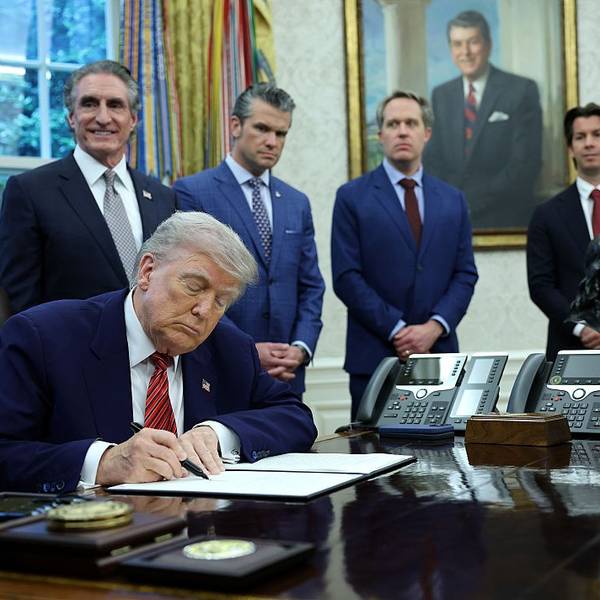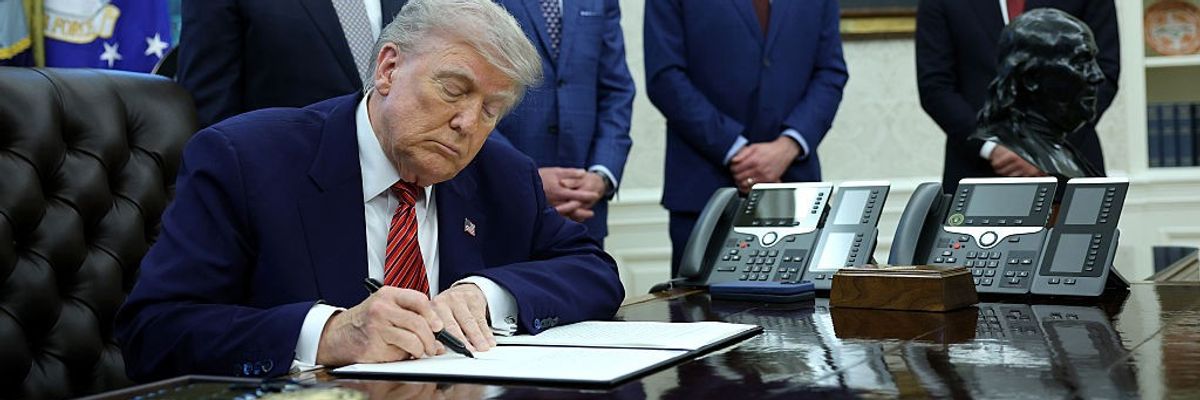U.S. President Donald Trump signed a series of executive orders on Friday that will overhaul the independent federal agency responsible for regulating the nation's nuclear power plants, aiming to expedite the construction of new nuclear reactors—a move that experts have warned will increase safety risks.
According to a White Housestatement, Trump's directives "will usher in a nuclear energy renaissance," in part by allowing Department of Energy laboratories to conduct nuclear reactor design testing, green-lighting reactor construction on federal lands, and lifting regulatory barriers "by requiring the Nuclear Regulatory Commission (NRC) to issue timely licensing decisions."
The Trump administration is seeking to shorten the years-long NRC process of approving new licenses for nuclear power plants and reactors to within 18 months.
"If you aren't independent of political and industry influence, then you are at risk of an accident."
White House Office of Science and Technology Director Michael Kratsios said Friday that "over the last 30 years, we stopped building nuclear reactors in America—that ends now."
"We are restoring a strong American nuclear industrial base, rebuilding a secure and sovereign domestic nuclear fuel supply chain, and leading the world towards a future fueled by American nuclear energy," he added.
However, the Union of Concerned Scientists (UCS)
warned that the executive orders will result in "all but nullifying" the NRC's regulatory process, "undermining the independent federal agency's ability to develop and enforce safety and security requirements for commercial nuclear facilities."
"This push by the Trump administration to usurp much of the agency's autonomy as they seek to fast-track the construction of nuclear plants will weaken critical, independent oversight of the U.S. nuclear industry and poses significant safety and security risks to the public," UCS added.
Edwin Lyman, director of nuclear power safety at the UCS, said, "Simply put, the U.S. nuclear industry will fail if safety is not made a priority."
"By fatally compromising the independence and integrity of the NRC, and by encouraging pathways for nuclear deployment that bypass the regulator entirely, the Trump administration is virtually guaranteeing that this country will see a serious accident or other radiological release that will affect the health, safety, and livelihoods of millions," Lyman added. "Such a disaster will destroy public trust in nuclear power and cause other nations to reject U.S. nuclear technology for decades to come."
Friday's executive orders follow
reporting earlier this month by NPR that revealed the Trump administration has tightened control over the NRC, in part by compelling the agency to send proposed reactor safety rules to the White House for review and possible editing.
Allison Macfarlane, who was nominated to head the NRC during the Obama administration, called the move "the end of independence of the agency."
"If you aren't independent of political and industry influence, then you are at risk of an accident," Macfarlane warned.
On the first day of his second term, Trump also signed executive orders
declaring a dubious "national energy emergency" and directing federal agencies to find ways to reduce regulatory roadblocks to "unleashing American energy," including by boosting fossil fuels and nuclear power.
The rapid advancement and adoption of artificial intelligence systems is creating a tremendous need for energy that proponents say can be met by nuclear power. The Three Mile Island nuclear plant—the site of the
worst nuclear accident in U.S. history—is being
revived with funding from Microsoft, while Google parent company Alphabet, online retail giant Amazon, and Facebook owner Meta are among the competitors also investing in nuclear energy.
"Do we really want to create more radioactive waste to power the often dubious and questionable uses of AI?" Johanna Neumann, Environment America Research & Policy Center's senior director of the Campaign for 100% Renewable Energy,
asked in December.
"Big Tech should recommit to solutions that not only work but pose less risk to our environment and health," Neumann added.




